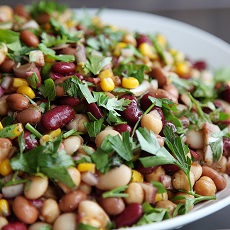
01/16/2018 03:07 PM EST

Source: National Library of Medicine
What is cholesterol?
Your body needs some cholesterol to work properly. But if you have too much in your blood, it can stick to the walls of your arteries and narrow or even block them. This puts you at risk for coronary artery disease and other heart diseases.
There are two main types of cholesterol. LDL is the "bad" cholesterol. A high LDL level leads to a buildup of cholesterol in your arteries. HDL is the "good" cholesterol. It carries cholesterol from other parts of your body back to your liver. Then your liver removes the cholesterol from your body.
What are the treatments for high cholesterol?
The treatments for high cholesterol are therapeutic lifestyle changes (TLC) and medicines. TLC includes a healthy diet, weight management, and regular physical activity.
What is a low cholesterol diet?
Therapeutic lifestyle changes (TLC) includes a low cholesterol diet. It is a healthy eating plan that can help you lower your cholesterol. Here are the different parts of the plan:
Choose healthier fats.You should limit both total fat and saturated fat. No more than 25 to 35 percent of your daily calories should come from dietary fats, and less than 7 percent of your daily calories should come from saturated fat. Depending upon how many calories you eat per day, here are the maximum amounts of fats that you should eat:
| Calories per Day | Total Fat | Saturated Fat |
|---|---|---|
| 1,500 | 42-58 grams | 10 grams |
| 2,000 | 56-78 grams | 13 grams |
| 2,500 | 69-97 grams | 17 grams |
Saturated fat is a bad fat because it raises your LDL (bad cholesterol) level more than anything else in your diet. It is found in some meats, dairy products, chocolate, baked goods, and deep-fried and processed foods.
Trans fat is another bad fat; it can raise your LDL and lower you HDL (good cholesterol). Trans fat is mostly in foods made with hydrogenated oils and fats, such as stick margarine, crackers, and french fries.
Instead of these bad fats, try healthier fats, such as lean meat, nuts, and unsaturated oils like canola, olive, and safflower oils.
Limit foods with cholesterol. If you are trying to lower your cholesterol, you should have less than 200 mg a day of cholesterol. Cholesterol is in foods of animal origin, such as liver and other organ meats, egg yolks, shrimp, and whole milk dairy products.
Eat plenty of soluble fiber. Foods high in soluble fiber help prevent your digestive tract from absorbing cholesterol. These foods include
- Whole-grain cereals such as oatmeal and oat bran
- Fruits such as apples, bananas, oranges, pears, and prunes
- Legumes such as kidney beans, lentils, chick peas, black-eyed peas, and lima beans
Eat lots of fruits and vegetables. A diet rich in fruits and vegetables can increase important cholesterol-lowering compounds in your diet. These compounds, called plant stanols or sterols, work like soluble fiber.
Eat fish that are high in omega-3 fatty acids. These acids won't lower your LDL level, but they may help raise your HDL level. They may also protect your heart from blood clots and inflammation and reduce your risk of heart attack. Fish that are a good source of omega-3 fatty acids include salmon, tuna (canned or fresh), and mackerel. Try to eat these fish two times a week.
Limit salt. You should try to limit the amount of sodium (salt) that you eat to no more than 2,300 milligrams (about 1 teaspoon of salt) a day. That includes all the sodium you eat, whether it was added in cooking or at the table, or already present in food products. Limiting salt won't lower your cholesterol, but it can lower your risk of heart diseases by helping to lower your blood pressure. You can reduce your sodium by instead choosing low-salt and "no added salt" foods and seasonings at the table or while cooking.
Limit alcohol. Alcohol adds extra calories, which can lead to weight gain. Being overweight can raise your LDL level and lower your HDL level. Too much alcohol can also increase your risk of heart diseases because it can raise your blood pressure and triglyceride level. One drink is a glass of wine, beer, or a small amount of hard liquor, and the recommendation is that
- Men should have no more than two drinks containing alcohol a day
- Women should have no more than one drink containing alcohol a day
Nutrition labels can help you figure out how much fat, saturated fat, cholesterol, fiber, and sodium is in the foods that you buy.
NIH: National Heart, Lung, and Blood Institute






















.png)











No hay comentarios:
Publicar un comentario